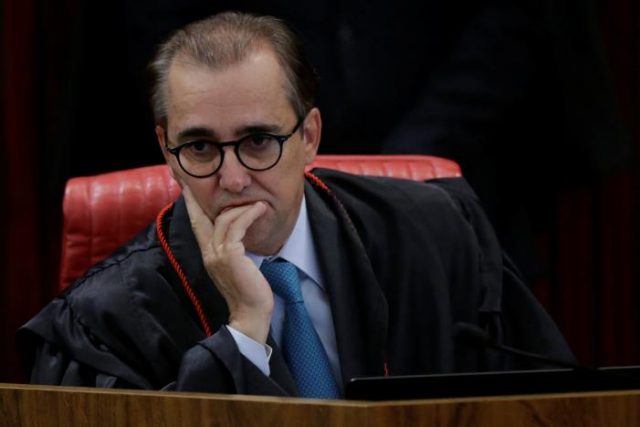
BRASILIA — Brazil’s top electoral court, the TSE, reopened a case on Tuesday about illegal campaign funding by the Rousseff-Temer ticket that could annul their 2014 election victory and unseat President Michel Temer.
Temer’s opponents see a court ruling as a way out of a political crisis set off by corruption allegations leveled against the center-right leader, but a decision could take weeks if not months and can be appealed by Temer.
The case was postponed in April to allow for new evidence arising from Brazil’s biggest ever corruption scandal involving billions of dollars in kickbacks paid by companies to scores of politicians and government officials.
The court’s decision is key to deciding the political future of Brazil, where the prospect of having a second president ousted in one year has generated political volatility. The uncertainty has weakened the Brazilian currency, stocks and bonds in recent days.
Temer was the running mate of leftist President Dilma Rousseff and replaced her when she was impeached last year.
If Temer is removed from office, lower house Speaker Rodrigo Maia would take over and Congress would have 30 days to pick a caretaker to lead the country until elections in late 2018.
Left-wing parties are calling for early general elections for Brazilians to pick a new president directly.
If Temer is found guilty, he is expected to appeal, which could delay the process for months. The government would likely destabilize and prompt members of his coalition to withdraw their support, increasing chances he could be forced to resign.
The main ally in Temer’s governing coalition, the Brazilian Social Democracy Party (PSDB), is waiting for the court ruling to decide whether to abandon Temer’s government, which would sink his fiscal reform agenda.
The electoral court had been expected to blame Rousseff and absolve Temer, but that is now unlikely due to recent plea-bargain testimony by executives of giant meatpacker JBS SA and engineering group Odebrecht who alleged they gave illegal funds to his campaign.
Temer has refused to resign since the Supreme Court late last month authorized an investigation against him for alleged corruption, racketeering and obstruction of justice.
The investigation is based in part on a secret recording of a conversation with a JBS executive in which Temer appeared to agree to the payment of hush money to silence a key witness in a massive graft scandal.
The political crisis engulfing Temer’s government deepened on Saturday with the arrest of a close aide, former lawmaker Rocha Loures, who was seen in a police video receiving a bag filled with 500,000 reais ($152,000) in cash.
The Supreme Court has given Temer until Friday to answers questions by federal police on his conversation with the JBS executive and whether Loures was a middleman.
Temer’s political standing took another blow on Tuesday with the arrest of his former minister of tourism, Henrique Eduardo Alves, for suspected graft in the building of a soccer stadium in northeastern Brazil for the 2014 World Cup.









